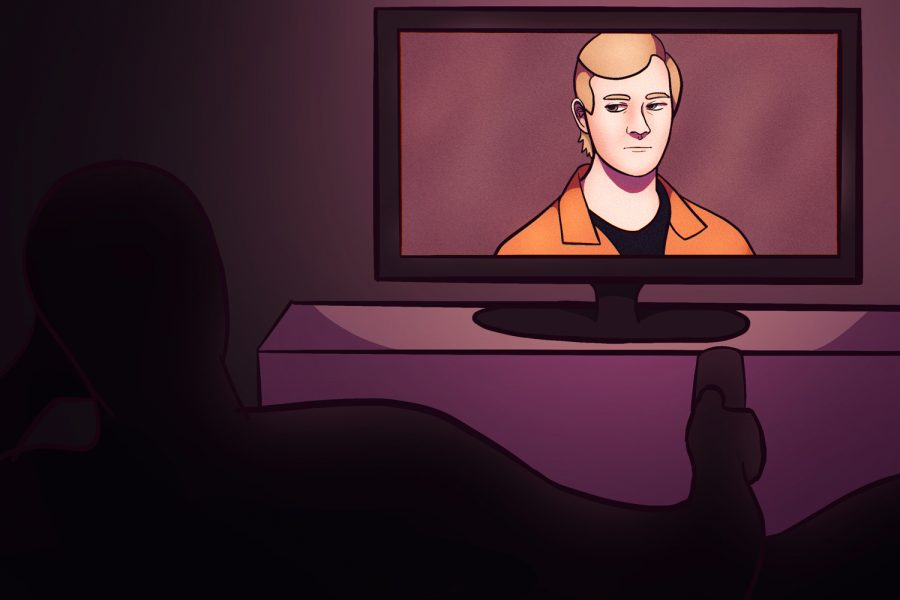OPINION: Why do we keep sensationalizing serial killers in pop culture?
Netflix needs to stop releasing fictionalized dramas about serial killers for entertainment
Netflix claims that “Dahmer” is a victim-centered work, but only one episode is from a victim’s perspective; so who is it really about?
October 5, 2022
Crime has always been a popular genre, but true crime is no doubt more fascinating than fictional crime.
However, when we watch movies and TV shows depicting the actions of notorious serial killers, are we watching from a place of wanting to understand how another human being can commit such monstrous acts, or are we watching merely for our own entertainment?
In a previous article, I touched on the sensationalization of true crime in the media. With the new Jeffrey Dahmer series on Netflix hitting the top charts, we must ask ourselves: is this series and others like it sensationalizing the vile acts of depraved killers?
Below are two adaptations of true crime cases that sensationalize America’s most notorious serial killers.
“Dahmer — Monster: The Jeffrey Dahmer Story”
Let us start with the series that prompted this piece. “Dahmer” follows the infamous serial killer and cannibal over the span of a few decades, showing the events that led up to his first murder and what ensued after.
Although this series is well-made and tries to focus on the victims by painting Dahmer as the monster he was, I cannot help but wonder why we need another adaptation of Dahmer.
I do not think it matters how they portrayed him; why are we giving him any more attention? Are we learning anything new? Not really.
This series is not a documentary; it is a fictionalized dramatization of events. Anne E. Schwartz, the crime reporter who first broke the story in 1991, said that “Dahmer” is not an accurate retelling of events.
“I had trouble with buy-in, because I knew that was not accurate. But people are not watching it that way, they’re watching it for entertainment,” she said to the Independent.
All the series is doing is reopening the wounds of his victims’ families who just want to heal, not hear about the brutal way that their loved ones were killed. Imagine trying to move past trauma like this, only to hear people talking about how good the new movie about your loved one’s killer is every few years.
At this point, I cannot even keep track of how many adaptations about Dahmer there are.
Despite Netflix claiming “Dahmer” is from the perspective of the victims, only one episode was from a victim’s point of view.
So let us be real – this series is not about the victims. People are not talking about the victims, people are talking about Dahmer.
Bottom line: this series is a money grab by Netflix, and was only made for entertainment purposes.
“Extremely Wicked, Shockingly Evil and Vile”
Having Ted Bundy, the notorious serial killer and rapist played by heartthrob Zac Efron – need I say more?
Although this casting choice was a conscious attempt to portray Bundy as the handsome charismatic man he cast as his public persona, it falls short of showing just how menacing he was.
The movie was meant to be told from the perspective of his girlfriend Liz Kendall, yet she hardly gets any screen time. The movie centers solely around Bundy and his life.
We learn almost nothing about his victims. They are used as mere plot devices to facilitate Bundy’s story, which works to humanize him to the audience.
“The film clearly doesn’t intend to sympathize with Bundy, yet in making him the star, it can’t avoid doing so to an extent,” according to The Atlantic.
The movie focuses so heavily on portraying Bundy as this charming guy with a dark side that it fails to address the true heinousness of his crimes. While I do think it is good the movie did not show graphic scenes of his rapes and murders to further exploit his victims, understanding the nature of his crimes is important to gain a complete picture of how twisted Bundy was.
Maybe the fact that the director thought it was unnecessary to include the graphic details suggests that making a movie about the man who committed these gruesome crimes is also perhaps unnecessary.
Personally, I do not believe that the best way to show what drove these serial killers to commit such inhumane acts is through a dramatized retelling. If people really want to understand the psychological reasons and factors that made these men serial killers, a documentary is a more suitable way to achieve that.
Humanizing serial killers on the big screen to show why they murdered people is only giving them sympathy from the audience. The only sympathy we should have is for Dahmer’s and Bundy’s victims.
My intent is not to shame people for consuming this type of media. Admittedly, I watched “Dahmer” and “Extremely Wicked” as soon as they came out. But we should not act like these movies and TV shows serve any purpose other than entertainment.
Why are we rehashing these stories over and over? How many sensationalized movies and TV shows about Dahmer and Bundy do we need before we are satisfied?








